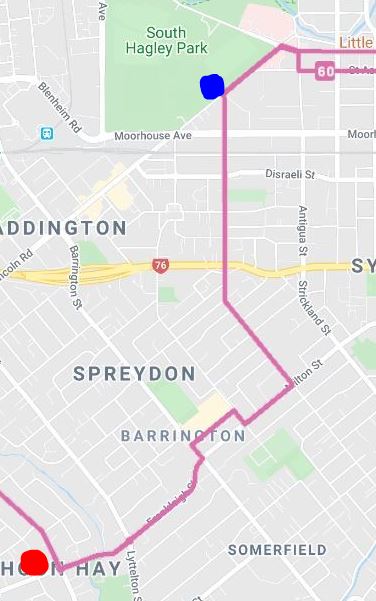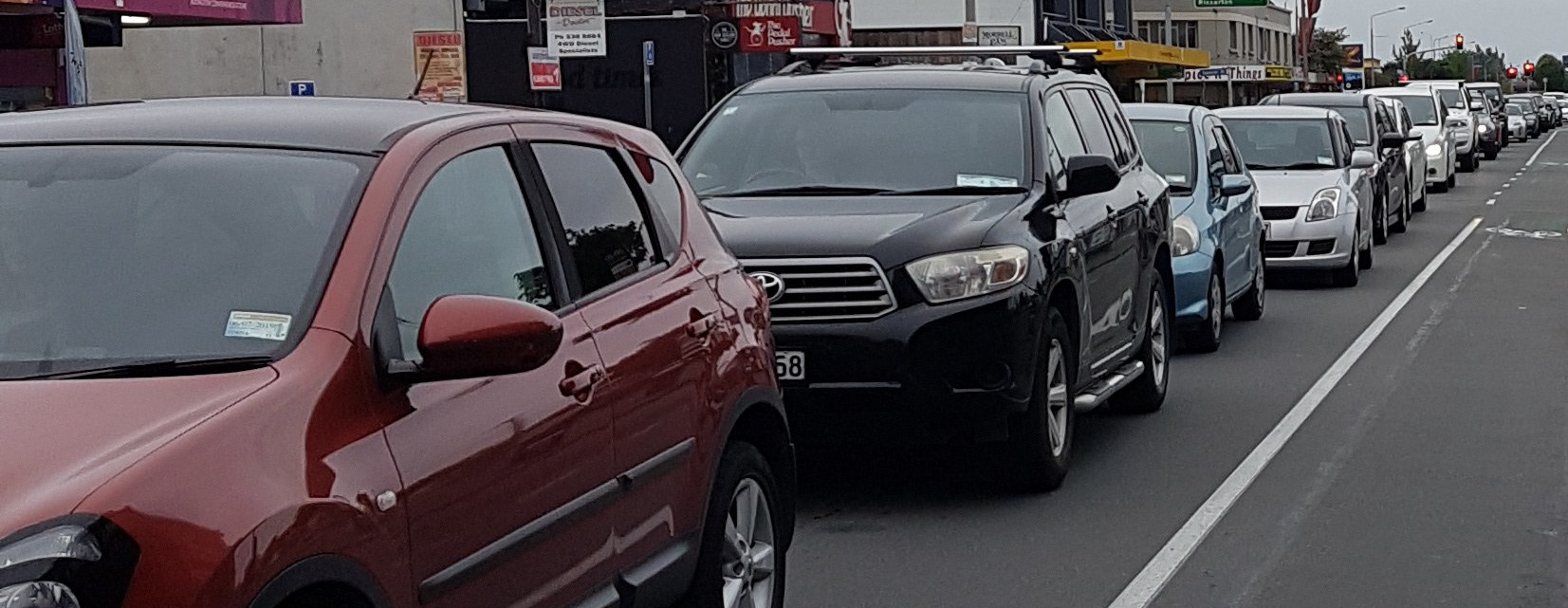I had an experience of Christchurch Car Culture this year. Earlier in the season my daughter started playing netball (in between various lock-downs). Netball starts shortly after school finishes on a Friday afternoon. She plays for her school team located at the red dot below, and the team plays at the netball centre located at the blue dot below. The pink line shows the Route 60 bus, which leaves the school at 3:32 and arrives at the netball centre eleven minutes later at 3:43. This timing couldn’t be more perfect for the netball game.

Everyone was aware that it would congested and difficult to find a car park at the netball centre. So how do you think the team chose to travel?

I suspect you guessed it – every single one drove. Some shared so I think it was five cars for the team. None of us caught the bus. I’d guess there would have been a couple of thousand people at the netball centre that day. Judging by the parked cars filling the streets for several blocks, it seems almost everyone else drove too.
I thought it was an interesting insight into the psychology of travel.
Catching the bus would have been faster. It would have been cheaper. It would have involved less walking. It would have resulted in less carbon, less congestion, and would have kept parking spaces available for those who really need them. In my mind it would have been simpler, less stressful, and more fun. I had suggested catching the bus to another parent, but she wasn’t keen.
I don’t think anyone was particularly anti-bus. It was more just that it didn’t even occur to anyone that the bus was an option available to them. And it was incomprehensible that it could actually be a more attractive option than driving. Most people in Christchurch are so used to driving that it’s just second-nature to jump into the car whenever you need to go anywhere. There’s no weighing up of the different options going on in people’s minds.
I sometimes wonder if the best way to get more people using the bus is to just do a gigantic marketing and information campaign. This would aim to make people aware driving isn’t the only way of getting everywhere. People do have choices when they travel and sometimes those other choices will be preferable. But it has to be really easy to access the information to make the best decision.
I suspect most people in Christchurch wouldn’t have a clue what buses go where at what times, and have no idea if bussing is a better option than driving or not. I think we probably need to invest more than we currently do to change this.

If the ratepayers want buses, then the Council sort them out. If the ratepayers want cars, then the Council sort them out. Their job, and their only job is to look after the ratepayers. If central government wants councils to do their work without being paid, then don’t do it. If the total experience of buses was better than cars, then that would be good. But CCC thinks that by deliberately making cars a crap experience for everyone, the exact opposite of what the ratepayers pay them to provide, then that is the same as making a bad bus experience a good experience.
In the example above, the parents would have had to leave their cars at Hoon Hay school, and then find their way back there after netball. From experience, this gives even less time for organising tea after netball, before the evening stuff. So the total car experience is still better, probably, than the total bus experience for most parents.
LikeLike
Yea agree that councils need to listen to what ratepayers want, but they do need to make sure they are really clear that the public are not technical experts. Ratepayers are saying they want a city that’s prosperous, sustainable, healthy, affordable, and easy to get around. It’s up to Council to figure out the technical detail of how best to provide this. If every technical expert agrees that good public transport is a critical piece of the puzzle for a city to be successful (which they do), then Council just needs to get on and provide it. Even if some members of the public don’t like the details, if Council are genuinely convinced that good public transport is the best way to achieve all the outcomes that those members are asking for, then they have a responsibility to push through the pain and do it anyway.
LikeLike
I think the regional and local council have a responsibility to provide efficient, affordable and sustainable transport. Part of this responsibility is to lead the way, informed by the scientific consensus on this. The sad reality in Canterbury is that public transport never has been given a serious chance. Seriously underfunded and lacking ambition and vision. This while motor ways. It is about time that we start thinking about offerering a credible alternative for most people. Build it and they will come..
LikeLike
Recently it hasn’t. Christchurch had a successful system in the 50s but it got ripped out. Then it had a fairly successful system through the 2000s till the city got destroyed. So it’s not even unprecedented. We have built good PT systems before and people have flocked to it.
LikeLike
I don’t vote for councils to lead the way. I vote for them to do what I want them to do. Spare me please from any politician that wants to ‘lead the way’ instead of doing what their electorate votes them in to do. Our housing, work , leisure, and pay rates are all built around the premise of personal independent transport. The only reason this does not work properly sometimes is because those we put in charge refuse to do the job we put them in, and pay them, to do.
LikeLike
It seems to me that there is a decent barrier to entry caused by the metrocard or cash requirement (possibly a bit of a reflection of my bubble of twenty-somethings who mostly didn’t grow up using public transport). There is basically nothing else in the city that you can’t purchase with just the cards already in your wallet.
To get a metrocard is a non-trivial, non-free, process that probably puts off a few casual users (and don’t get me started on topping it up online!). Contactless cards are prevalent enough that they should be accepted on any bus.
I understand that these types of casual users aren’t likely to drive big ridership increases, but I think to serve these trips better improves the wider perception of the bus system as a useful and accessible thing.
LikeLike
Yea metro card was state of the art when it came in but it’s now what, 20 years on, and it’s still the same system. Central Government have been promising a national ticketing system for almost a decade now but it’s never arrived. This would allow people to use modern payment methods- cards, phones watches etc. Its currently being promised for end of next year.
LikeLike